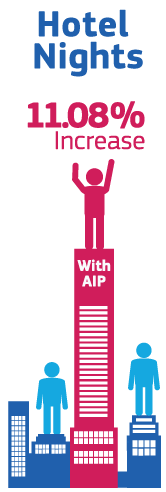The second in our “Why Does Placement Matter?” series examines how placement of a property in an availability list or booking window impacts overall room nights. For more information on how placement impacts hotel bookings, please view Part 1 of this series.
Is there value associated with preferential placement?
In the first part of our series, we discussed key statistics surrounding the value of placement in search rankings. A quick search online reveals several statistics worth your consideration. We’ve seen these statistics to be true as it relates to responses to online RFPs. We also discovered the impact of preferential placement on hotel bookings. Let’s take this examination a step further.
Who is your guest?
The 2014 Lodging Industry Profile prepared by the American Hotel & Lodging Association provides us with helpful statistics for the United States travel and tourism industry.
- The typical lodging customers in 2013 are profiled as 41% business traveler and 59% leisure traveler.
- On average, business traveler trends show that 40% will stay for one night, 23% for two nights, and 37% for three or more nights.
- When considering typical leisure travelers, 50% spend one night, 26% spend two nights, and 24% spend three or more nights.
- In 2013, 25.1 million overseas travelers stayed in a hotel/motel during their U.S. visit. The average length of stay was 9.7 nights, with 64% traveling for leisure.
Additionally, several industry analysts have forecasted that 2015 will end on a high note with increases in year-over-year occupancy levels and room rates. Taking these statistics into consideration when reviewing your current marketing initiatives and revenue targets will help you build a plan for success.
How can properties increase hotel nights?
In short, our study revealed that when properties take advantage of preferential placement by enrolling in Amadeus Instant Preference (AIP) they realize an increase in hotel nights. Based on the sampling of data evaluated, overall hotel nights for the analyzed group enrolled in AIP increase by 11.08% while Amadeus hotel nights as a whole grew by 6.09% during the same time.
What does this mean for hotels?
Combining the results of the first two parts in our series, we learn that preferential placement provides properties with the advantage of increased bookings (11.25%) and increased nights (11.08%).
When a hotel room is not sold tonight, that revenue potential is gone. You can’t recover last night’s missed revenue tomorrow. Have you built a proactive plan to ensure that you are consistently filling your rooms? Have you contemplated new ways to expand your customer base and reach out to a consistently growing market of international travelers? Studies show that preferential placement is a valuable tool in your business strategy.
Learn more about preferential placement with AIP




